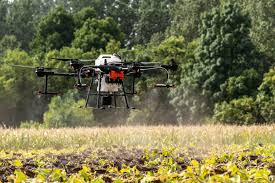Farmers need better weather conditions for their crops and improved crop yields. The following measures can address this: Spray crops using drones, commonly referred to as uncrewed aerial vehicles or UAVs. Drones can help in applying pesticides or fertilizers very efficiently. This article provides reasons why using a drone for spraying crops in Auburn is advisable.
Why Use Drone for Spraying Crops in Auburn?
Drones apply fertilizers, pesticides, or any related crop nutrient more evenly than conventional practices. They assist in localizing areas that require attention with a high level of precision. Drones reduce the time and effort needed for farmers. Farm workers are not compelled to drag hoses across large fields to spray pesticides. A drone can spray terrain that a tractor cannot access. They can handle weather problems much better than the pilots of the human-crewed aircraft. Drones minimize the use of chemicals as they spray only on the targeted area. In the long run, it helps the farmer incur fewer expenses than the usual practice of animal farming.
Advantages of Using Drones in Spraying Crops
Drones Provide Precision Application
Hinterland Drones are equipped with special sensors. These sensors assess the crop status in equal areas and acre by acre. The sensors identify areas with pests or where nutrients are lacking. Then, the drone modifies the spray in the direction of its targeted area. Dealing with problems directly is more accurate than using a broad-spraying approach to solve them. Less chemical waste occurs. You require more chemicals, but you use them only on the plants that need them. Crop health and yields increase.
Drones are time and labor savers.
Spray equipment mounted on tractors could be mounted faster. To patrol a whole farm by bringing the vehicle on the ground can take hours. Drones do tasks in a shorter period than the regular period. The farmer saves time, which he can use to engage in other activities. They also minimize the farmer’s physical exertion. It does not mean that one has to spend hours riding equipment to do manual spraying work.
Drones Reach More Terrain
Wet spots are common in many farm fields, and some have hills or ditches that create uneven terrain. Tractor wheels can sometimes get stuck when they go in these areas. Crops that have not been sprayed in these zones are at risk. A Drone for spraying crops in Auburn is capable of hovering and spraying over any kind of surface. Their flexibility covers more than just the total amount of acreage.
UAVs Can Pesticide Wherever Weather Interference
Early morning storms can hamper spraying by reducing the possibility of using planes or tractors. However, light rains and winds do not necessarily cause drones to be grounded when spraying crops in Auburn. Weather can change, and farmers can continue to spray crops with drones when the weather is unstable, reducing interruptions to spraying routines. When crops require unique treatments, drones can provide them. Sometimes, drones help control diseases and pests more effectively.
Reduced Crop Damage in Case of Mistakes
Inexperienced tractor operators, at times, apply the wrong treatment intentionally or due to ignorance. Or they ignore a part of a field. When this occurs, farm chemicals harm crops. They deploy programmed spray plans depending on the needs of the crops to be sprayed on each field. Their automated flight helps them avoid blunders. Drones do not make mistakes that humans do when the crops are being tended; thus, crops are less damaged.
Factors to Emulate When Deploying Drones for Agricultural Spraying
Learn Local Laws First
There are federal laws and city ordinances governing the use of drones. It is also important to note that some state laws also regulate agriculture technology. Ensure there are appropriate permissions for the use of drones to spray crops at Auburn in the current season. Also, observe personal prohibited areas defined as close to homes or animal grazing fields. Comply strictly with all the safety regulations governing the aviation industry. It is done to ensure that the drone remains within the legal requirements of the law and that members of the public are protected from the risks associated with the operation of the drone.
Conclusion
Applying the concept of targeted spraying using a drone for spraying crops in Auburn is advantageous to farmers. Drones increase the effectiveness of chemical applications by improving precision. They eliminate wastage costs and boost crop productivity in large production areas. Drones also reduce labor costs throughout all the seasons used for delivery. By incorporating drones into spray equipment, Auburn agriculture can advance technologically. Responsible use of drones meets the emerging needs of local farms and ultimately increases the availability of fresh food on consumer plates. Visit here for a related post!
Elevate your farming with Hinterland Drones. Contact them to optimize your crop spraying today









Leave a Reply
View Comments